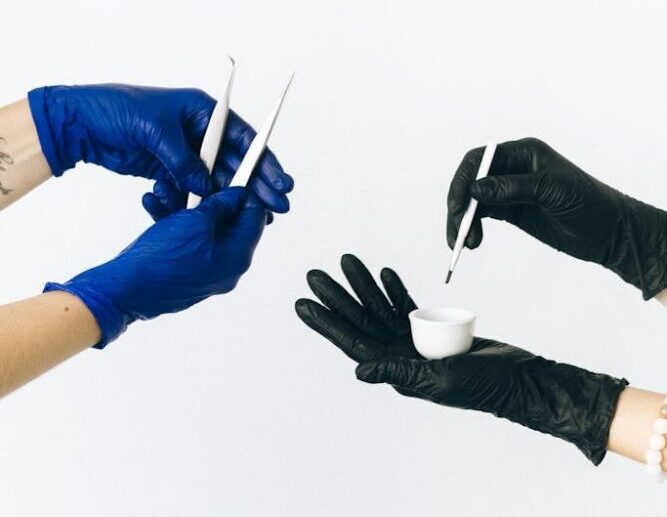The Ultimate Glove for Pest Control: How Black Nitrile Gloves Protect Against Hazardous Materials
Pest control professionals encounter various hazards in their work, including the handling of chemicals and the risk of interacting with harmful pests and contaminated environments. To ensure safety, personal protective equipment (PPE) is crucial, with gloves being a vital component. Black nitrile gloves have become the top choice for pest control technicians because of their durability, chemical resistance, and comfort. This article delves into the reasons why black nitrile gloves are the best option for pest control professionals and how they safeguard against hazardous materials.
The Role of Gloves in Pest Control
Pest control technicians handle various pesticides, chemicals, and materials that can be hazardous if they touch the skin. It’s crucial to wear the appropriate gloves to guard against:
-
Chemical Exposure: The pesticides, insecticides, and other chemicals used in pest control can lead to skin irritation, burns, or even long-term health problems. Gloves act as a protective barrier, preventing these substances from making direct contact with the skin.
-
Contaminated Environments: Pest control often requires working in unsanitary or contaminated spaces, such as basements, crawl spaces, or attics. Wearing gloves helps shield against harmful materials like rodent droppings, mold, and bacteria.
-
Pest Bites and Stings: Pest control professionals regularly come into contact with insects, rodents, and other pests that might bite, sting, or scratch. Sturdy gloves protect the hands from these risks, allowing technicians to work safely and with confidence.
Why Black Nitrile Gloves Are the Best Choice for Pest Control
While there are many types of gloves available, black nitrile gloves are particularly effective for pest control technicians. Here’s why:
-
Chemical Resistance: Nitrile gloves are known for their high resistance to a variety of chemicals, including pesticides, disinfectants, and cleaning agents. This feature is essential for pest control professionals who frequently handle toxic substances.
-
Puncture and Tear Resistance: Pest control tasks often require dealing with sharp objects, rough surfaces, or animals that might bite or scratch. Nitrile gloves provide excellent puncture resistance compared to latex or vinyl options, making them ideal for safeguarding against these risks.
-
Latex-Free and Hypoallergenic: Being latex-free, nitrile gloves minimize the chances of allergic reactions for both technicians and clients who may be sensitive to latex. This allows all technicians to wear the gloves comfortably without worrying about skin irritation.
-
Enhanced Grip and Dexterity: Many black nitrile gloves come with textured fingertips, which improve grip—especially important when handling small tools, applying chemicals, or working in tight spaces. The gloves are flexible and offer tactile sensitivity, ensuring that technicians can maintain control and precision during their tasks.
-
Professional Appearance: The black color of these gloves lends a professional touch and discretion, hiding stains and maintaining a clean look even in dirty or challenging conditions.
Key Features to Look for in Black Nitrile Gloves for Pest Control
To ensure maximum safety and effectiveness, pest control professionals should consider the following features when selecting their black nitrile gloves:
-
Chemical Resistance Rating: Not all nitrile gloves provide the same level of chemical resistance. It’s crucial to choose gloves that are specifically rated for the types of chemicals used in pest control to guarantee adequate protection.
-
Thickness and Durability: Pest control professionals should opt for gloves that find a balance between thickness and flexibility. Thicker gloves offer better protection against punctures and chemicals, while thinner gloves allow for greater dexterity. Medium-thick gloves (typically around 5-6 mils) often represent the best compromise.
-
Textured Grip: Gloves with textured fingertips or palms are perfect for improving grip, especially when handling slippery or small items like sprayers, bait stations, or inspection tools.
-
Proper Fit: Gloves that don’t fit well can undermine safety and effectiveness. Gloves that are too tight may tear, while those that are too loose can hinder dexterity. Technicians should choose gloves that fit snugly and comfortably to ensure maximum protection and performance.
Benefits of Black Nitrile Gloves for Pest Control Professionals
Using black nitrile gloves in pest control offers several benefits that enhance both safety and efficiency:
-
Protection from Chemical Exposure: Nitrile gloves provide dependable protection against the various chemicals and pesticides commonly used in pest control, allowing technicians to work safely and confidently without the risk of skin contact.
-
Barrier Against Contaminants: When handling rodent droppings, mold, or other hazardous materials, nitrile gloves serve as a protective barrier, helping to prevent contamination and reduce health risks.
-
Durability in Harsh Environments: Black nitrile gloves are built to endure tough conditions. Their puncture resistance ensures that technicians stay protected while working in rough or unsanitary settings, lowering the chances of injury from sharp objects or animal bites.
-
Improved Grip and Precision: The textured surface of black nitrile gloves enhances grip, which is crucial for handling small tools, applying products accurately, and working in confined spaces. This leads to greater accuracy and efficiency, benefiting both technicians and clients.
-
Comfort and Flexibility for Extended Wear: Pest control professionals often work long hours, so it’s important for gloves to be comfortable and flexible. Black nitrile gloves are designed to fit snugly while allowing for movement, ensuring that technicians can wear them for extended periods without discomfort or hand fatigue.
Best Practices for Using Nitrile Gloves in Pest Control
To ensure the effectiveness and safety of black nitrile gloves, pest control professionals should adhere to the following best practices:
-
Select the Appropriate Gloves for Each Task: Depending on the chemicals and environments involved, technicians may require various types of gloves. For example, when dealing with highly corrosive substances, it’s advisable to use thicker gloves that offer higher chemical resistance ratings.
-
Change Gloves Regularly: Disposable gloves are intended for single use. It’s crucial to replace gloves between tasks or whenever they become torn, contaminated, or otherwise compromised. This helps prevent cross-contamination and maintains ongoing protection.
-
Store Gloves Correctly: To preserve the quality and effectiveness of nitrile gloves, keep them in a cool, dry location away from direct sunlight and chemicals that could damage their material.
-
Educate Staff on Proper Glove Use and Disposal: Technicians should receive training on how to correctly wear, remove, and dispose of gloves. This includes methods for safely taking off gloves without touching the outer surface and disposing of them in designated waste containers.
In the pest control industry, safety is crucial. Selecting the appropriate gloves is vital for shielding technicians from chemical exposure, contaminated environments, and pest-related risks. Black nitrile gloves from Octane Gloves offer an excellent solution for pest control professionals, delivering the durability, chemical resistance, and grip necessary for safe and effective operations.
By using high-quality black nitrile gloves in their daily routines, pest control technicians can safeguard themselves and their clients, ensuring a safe, hygienic, and professional service with every job.


